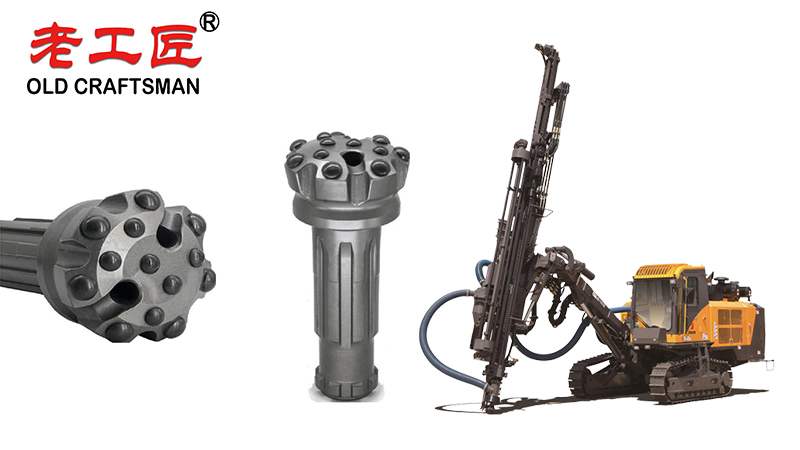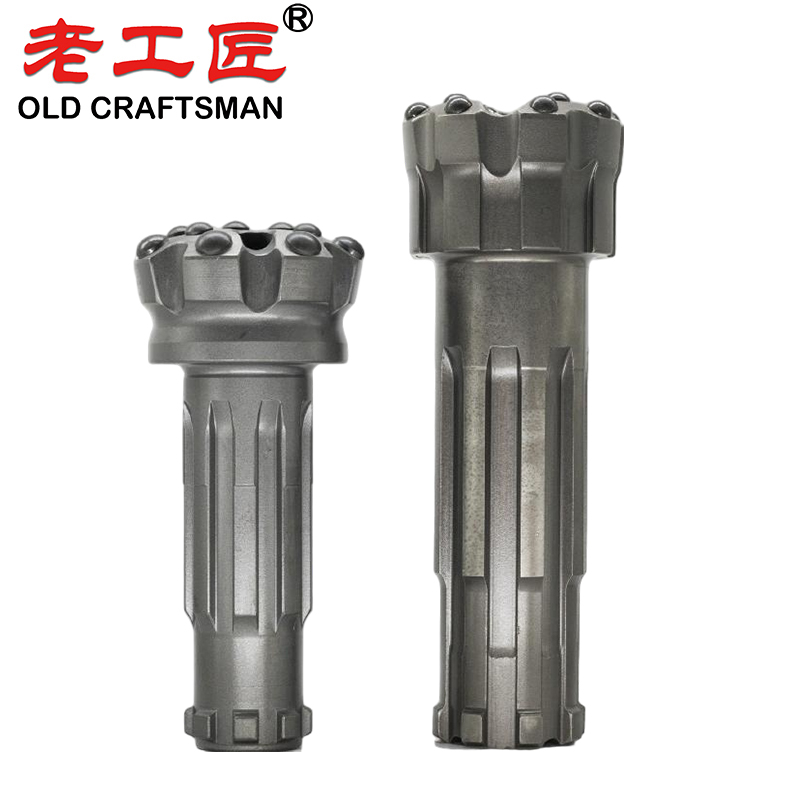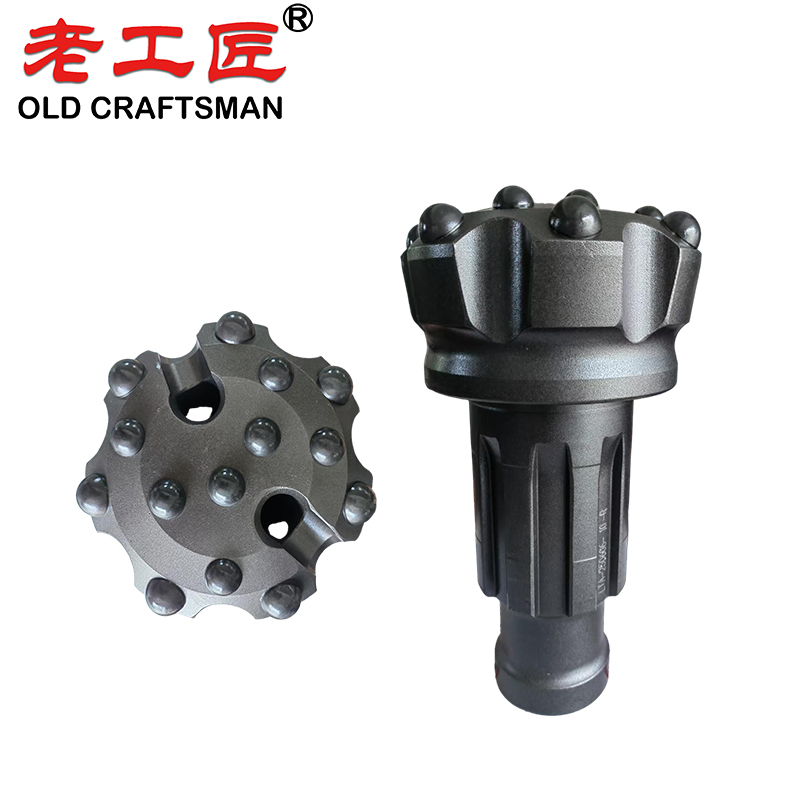The drilling industry is undergoing a quiet revolution. As environmental, social, and governance (ESG) criteria become critical for project approvals and corporate reputation, the demand for sustainable practices is reaching the very tip of the drill string. Eco-friendly DTH drill bits are no longer a niche concept but a smart, forward thinking choice for reducing environmental footprint, lowering total operational costs, and enhancing worksite safety.

This guide breaks down what makes a DTH drill bit “eco-friendly” and the sustainable choices available today.
The Environmental Impact of Traditional DTH Drilling
Before looking at solutions, it’s important to understand the problems traditional drilling can cause:
- High Energy Consumption: Inefficient bits require more air pressure and hammer energy, leading to higher fuel consumption for compressors.
- Resource Depletion: Frequent bit changes and failures consume vast amounts of steel, tungsten carbide, and other finite materials.
- Waste Generation: Worn-out or broken bits often end up in landfills, along with the metal shanks and other components.
- Chemical Contamination: Some older bit designs or drilling additives can introduce harmful chemicals into the ground.
The Pillars of an Eco-Friendly DTH Drill Bit
An eco-friendly DTH bit is defined not by a single feature, but by its entire lifecycle from manufacturing to performance to end-of-life. The core principles are:
- Longevity and Durability: A bit that lasts longer directly reduces material consumption, waste, and the carbon footprint associated with manufacturing and shipping replacements.
- Efficiency and Performance: A bit that drills faster and with less energy reduces fuel consumption and greenhouse gas emissions on-site.
- Recyclability and Reusability: Bits designed for repair and whose materials can be easily recycled at end-of-life.
- Responsible Manufacturing: Sourced from manufacturers who prioritize sustainable practices in their own factories.
Sustainable Choices for the Modern Driller
Here are the key strategies and technologies to make your DTH operations more sustainable.
1. The Gold Standard: Retipped/Repaired Bits
The single most sustainable choice you can make is to move away from a “use-and-discard” model.
- How it Works: Instead of throwing away a worn bit, it is sent to a specialized service center. The worn carbide buttons are removed, the sockets are re-machined, and new, high quality buttons are pressed in.
- Environmental Benefit:
- Massive Waste Reduction: Saves 60-80% of the raw material compared to a new bit.
- Lower Carbon Footprint: The energy required for retipping is a fraction of that needed to forge a new steel body.
- Conserves Resources: Extends the life of the durable steel body multiple times.
- Modern Driller’s Tip: Partner with a reputable bit repair service. The quality of their carbide and pressing process is critical to ensuring the retipped bit performs as well as, or sometimes even better than, a cheap new bit.
2. High-Quality, Long-Lasting New Bits
When a new bit is necessary, investing in premium quality is an eco-friendly decision.
- Superior Materials: Look for manufacturers who use:
- High-Grade Alloy Steels: For a tougher, more fatigue resistant bit body that is less prone to breakage.
- Premium Tungsten Carbide: Denser, more consistent carbide buttons resist wear and breakage far better, maintaining penetration rate for longer.
- Advanced Design: Features like optimized fluid (air) flow channels reduce energy loss and improve hole cleaning, making the compressor work more efficiently.
- Environmental Benefit: Fewer bit failures, less downtime, and fewer bits consumed per meter drilled.
3. Bit Designs for Specific Formations
Using the wrong bit for the rock formation is incredibly wasteful. It leads to rapid wear, poor performance, and high energy use.
- Application-Specific Selection:
- Soft to Medium Formations: Choose bits with fewer, larger buttons for faster penetration.
- Hard, Abrasive Formations: Choose bits with more, smaller, and harder grade buttons for maximum wear life.
- Environmental Benefit: Optimized performance reduces drilling time and energy consumption while maximizing the bit’s useful life.
4. The Circular Economy Model
Forward-thinking manufacturers and suppliers are now offering DTH bits as part of a “Product-as-a-Service” or take-back program.
- How it Works: You purchase the drilling service (meters drilled) rather than the physical bit. The supplier maintains ownership and is responsible for maintenance, retipping, and final recycling.
- Environmental Benefit: This aligns the supplier’s incentives with longevity and recyclability, creating a closed-loop system where materials are constantly recovered and reused.

A Practical Checklist for the Sustainable Driller
| Action | Environmental & Economic Benefit |
|---|---|
| Prioritize Bit Repair/Retipping | Drastically reduces waste and cost per meter. |
| Choose High Quality over Low Cost | Longer life, fewer failures, lower total consumption. |
| Select the Correct Bit for the Geology | Optimizes energy use and extends bit life. |
| Implement a Bit Tracking System | Monitor performance and lifecycle to plan repairs. |
| Partner with “Green” Suppliers | Choose manufacturers with take back programs and sustainable practices. |
| Properly Maintain Drilling Equipment | Ensure the hammer and drill string are in good condition to prevent premature bit damage. |
| Recycle Worn-Out Bits | Never send scrap steel and tungsten carbide to a landfill. Sell to metal recyclers. |
Conclusion: Drilling a Greener Path Forward
For the modern driller, being eco-friendly is not just about “being green”it’s about operational excellence. Sustainable DTH drill bit choices lead directly to:
- Lower Total Cost of Ownership
- Reduced Downtime
- Enhanced Project Sustainability Credentials
- A Smaller Environmental Footprint
By embracing retipping, investing in quality, and selecting bits wisely, drillers can powerfully demonstrate that industrial progress and environmental responsibility can, and must, go hand-in-hand. The most sustainable meter drilled is the one that consumes the fewest resources, and it starts with the bit at the bottom of the hole.

Some countries remains heavily reliant on fossil fuels, particularly natural gas, as a primary source of energy, despite growing investments in renewable energy like solar panels and wind turbines. In industries such as mining and oil and gas exploration, high performance DTH (Down-The-Hole) drill bits made with cemented carbide cutting edges are widely used to access these underground reserves efficiently. Although these operations consume a significant amount of energy, the durability and precision of modern cemented carbide tools actually improve overall energy efficiency compared to older designs. At the household level, Americans are increasingly aware of their electricity bill and total energy usage switching to energy efficient LED light bulbs, high performance air conditioners, and rooftop solar panels can substantially reduce both the amount of electricity consumed and overall energy costs, while providing a wide range of reliable, cleaner energy sources for the future.
“Zhuzhou Old Craftsman Precision Alloy Co., Ltd. could make tungsten carbide wear parts and make your equipment use life is tens of times longer than before! We specialize in providing customized carbide wear products solutions to meet the demanding requirements of industries such as aerospace, automotive, mining, and precision machining.”
Belt scraper Brazing brazingprocess CARBDIE HAMMER carbide Carbide belt scraper carbidebrazing carbide hammer Crusher CRUSHER HAMMER Informational Internal stress metal mining Refractory Brick Mold Secondary belt cleaner scraper stresses VSI crusher wear plates welding